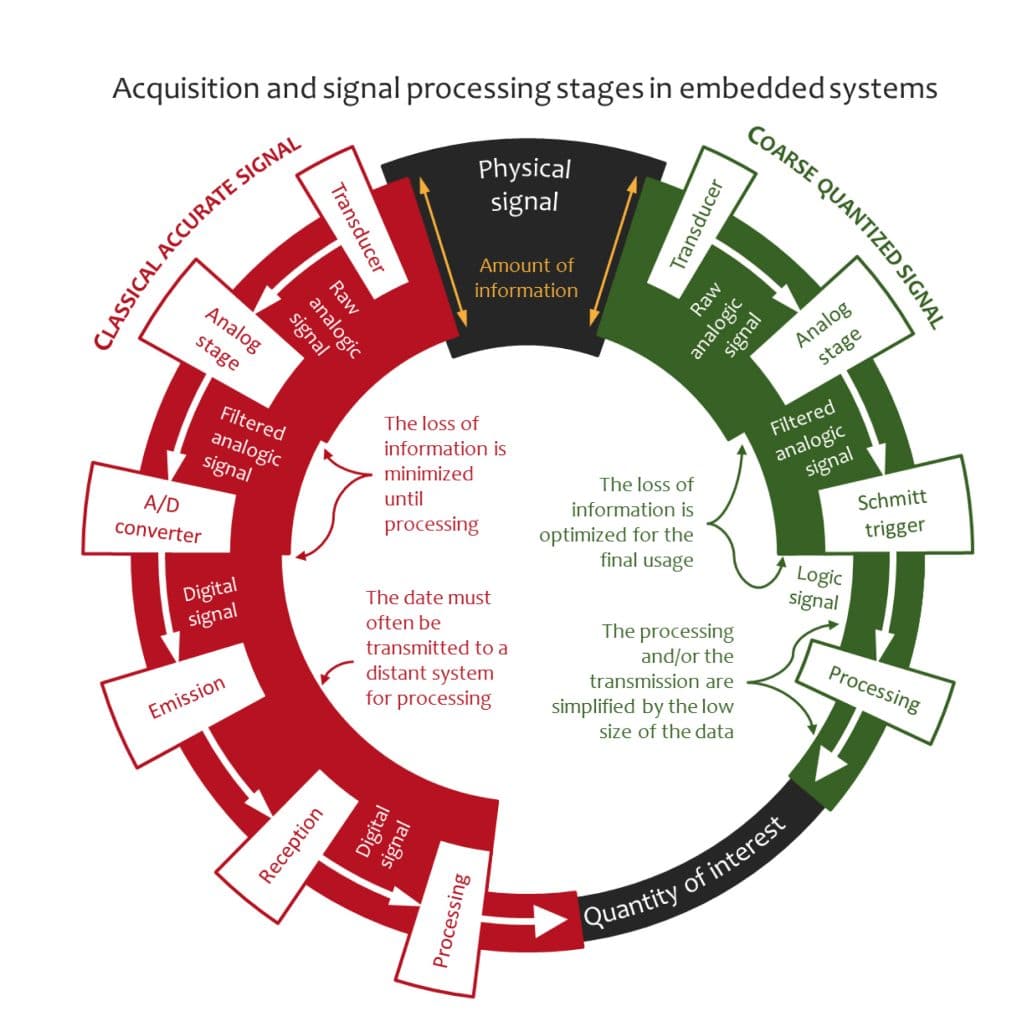🎓 Qualification : PhD • 🤝 Employment type : 3 year contract • 📍 Location : Grenoble, France
CEA-Leti is seeking an accomplished junior investigator to bring new insights to the institute’s research to massively reduce sensor data for frugal IoT solutions. The winner of this three-year Science Impulse fellowship will manage their own groundbreaking research project and have an opportunity to work with CEA and other Grenoble-based research teams.
Background
To cope with the data deluge and head off the disastrous environmental consequences of unchecked digital expansion, the data processing community has turned its attention to digital frugality. Frugal embedded systems will have to be more economical in terms of power and memory, of course, but they will also have to be built on much simpler hardware and software.

This challenge is creating new research opportunities across the data acquisition and processing chains. For electronic systems, analog processing and analog-to-digital conversion are among the main sources of energy consumption at low size of the date, followed by storage, digital processing, and signal transfer at higher size of the data.
Coarse data quantization hinges on the extreme simplification of analog-to-digital conversion to obtain—in the best-case scenario—a logic signal (with a depth of 1 bit). This allows the use of simpler analog electronics, where the concern is eliminating noise, not returning a high-fidelity signal. In addition, the signal obtained is light and easy to process and transmit. But what information can the signal carry? This is the question the proposed research should answer.
Scope and applications
Mathematical studies have shown that it is possible to extract phase and frequency information from low-variability vibration and acoustic signals to detect abnormalities. The machines and power electronics often found in industrial environments emit these kinds of signals. But factories are not the only potential application from coarse data quantization. Research in biotechnology, image processing, optical and chemical sensors, and embedded artificial intelligence could leverage this approach to support the development of portable devices and reach a wider market. The challenge is to move from mathematical studies to implementation in real systems.
The objective of this project is to develop an ultra-low-power system demonstrator able to detect patterns or anomalies in sound or vibration signals emitted by machine bearing, gear, or belt fatigue; capacitor aging in power electronics; and—a more unusual application—animals’ footsteps or wings in forest environments. In terms of new scientific knowledge, the project will break new ground in hardware-dedicated co-optimized embedded processing. The potential applications include ultra-low-power components and frugal and industrial IoT for predictive maintenance, imaging, and precision farming.
Job description
CEA-Leti is seeking an accomplished junior investigator with expertise in embedded processing, mathematics, and circuit architectures with a strong desire to contribute to frugal sensor data processing solutions such as compressive sensing. The design of mechanical and/or electronic test benches to emit the signals being studied will be part of the project. A CPU and logic circuit will also have to be designed. The successful candidate will have to be able to factor any circuit design constraints into their processing choices and, ideally, design a circuit for implementation on a FPGA. A variety of approaches based on hardware-software co-development and models will be explored to overcome the challenges to implementation.
The successful candidate will be assigned to the CEA-Leti Sensor Autonomy and Integration Laboratory. The lab designs innovative electronic systems and functions and integration solutions (including autonomy and communication solutions) for end users of IIoT solutions in manufacturing, aerospace, consumer goods, and other industries.
The fellowship includes access to state-of-the-art hardware and software platforms dedicated to the dimensioning, characterization, and multiphysics simulation of ultra-low power electronic systems up to the highest degree of complexity and integration, working with CEA-Leti experts in embedded systems and chips (processors and FPGAs); ultrasonic, audio, and vibration frequency signal acquisition; ultra-low-power systems for energy harvesting; and signal processing.
The successful candidate will collaborate with stakeholders across the value chain, from CEA-Leti component designers to our R&D partner companies. As principal investigator, the candidate will be in charge of a research project that aligns with the host laboratory’s research objectives in coordination with other experts who can add value to the project’s overall objectives. A multi-disciplinary contribution is expected, as is a demonstrated capacity to work in a multi-disciplinary, multi-project environment.
Biblio references
- Compressed and quantized correlation estimators, AG Zebadua et al., IEEE Transactions on Signal Processing, 2016
- Compressive Classification Based on One-Bit Measurements, Q Liu et al., 2019 IEEE/CIC International Conference on Communications, 2019
- Performance limits of one-bit compressive classification, W Xu et al., Signal Processing, 2021




